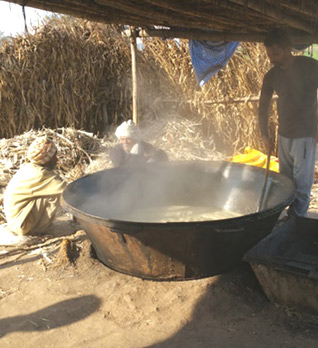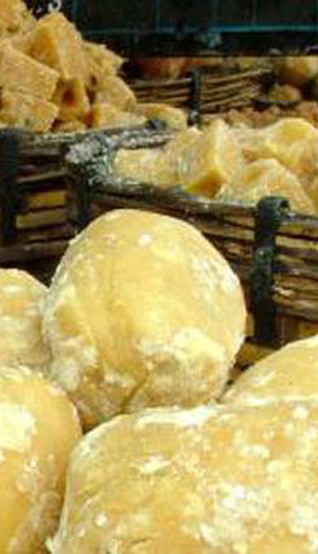Cuisine
Chewing On Freshly-Made Gurrh Along Punjab’s Highways
THE INDIAN EXPRESS
Driving along highways in Punjab during the winter season can be a sweet and interesting experience -- literally, that is!
At several places in the sugarcane growing belts of Punjab, cars, buses and other vehicles can be seen halted at places where local farmers are making fresh 'gurrh' at makeshift jaggery-making units
With hundreds of gurrh (jaggery) manufacturing units lined up near the sugarcane fields along the highways, it seems like a real sweet-time for farmers and people who stop there to taste the freshly prepared ‘gurrh’ and ‘shukkur’ (powdered gurrh).
“We all like to have gurrh and shukkur, especially in the winter months. To have it so fresh is a different experience altogether. It is also nice to see the farmers make it in front of you,” said a software professional who stopped at one of the gurrh units with her mother near Chunni village, 30 km from Chandigarh, Punjab.
“The very sight of gurrh and shukkur is attractive and many motorists stop to taste it and buy it for later use. The air around the place where gurrh is made smells sweet too,” she said.
People can be seen tasting the gurrh and shukkur, which is put up by the farmers on makeshift tables. Most of them buy stocks for their homes.
Farmers who grow sugarcane too are happy to set up the makeshift manufacturing units on the agricultural fields along the highways.
“This activity lasts for over one month in winter. It is good business for us -- but we have to face competition from other farmers too. At some places, the gurrh units are located very close. It takes half a day to convert the sugarcane into jaggery,” farmer Gurwinder Singh said about his farm near Sirhind town.
The farmers are happy to share their produce with the people.
“People love to taste the freshly made gurrh. Some even want to taste the hot gurrh from the large tray where it is put for drying up. We give an adequate sample for tasting, and we don’t charge for it,” farmer Kirpal Singh said.
Farmers use basic equipment and raw materials to make the gurrh from sugarcane. The sugarcane juice is boiled in a big iron utensil on firewood and constantly churned till it thickens. It is then left to cool and harden.
The price of gurrh and shukkur ranges from Rs 40 - 60 per kg. The gurrh available is in two varieties -- plain, and with ‘saunf’ (fennel).
One last thing -- you don’t need a sweet tooth to enjoy the gurrh and shukkur. So, go ahead and indulge!
[Edited for sikhchic.com]
January 21, 2016
Conversation about this article
1: Sangat Singh (Kuala Lumpur, Malaysia ), January 21, 2016, 5:18 PM.
When I was sort of studying in Goverment College, Ludhiana, Punjab, in 1948-52 we often played truant to go to a nearby sugarcane farm, especially during deep winters when gurrh-making was in progress. There is a saying that a farmer would kill you if you plucked his sugarcane but would freely share his freshly made gurrh – a nostalgic period I remember to this day. Much later, there was a sweet spanner in the works in the words of Sheikh Farid: “Fareedaa shukker khand nivaat gurrh maakhi-o maanjaa dudh / sabhay vastoo mithee-aan rubb na pujan tudh” [GGS:1379.6] - 'Farid: sugar cane, candy, sugar, molasses, honey and buffalo’s milk – all these things are sweet, but none will help you reach Him.' Please do not let this dissuade you from this mild little transgression and not to taste that wonderful gurrh




